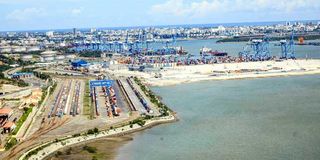Blow to traders as Kenya Ports Authority seeks upfront service fee

An aerial view of the port of Mombasa in December 2021. The Kenya Ports Authority (KPA) will cease to render port services on a credit basis as it implements new directives to streamline cargo exports at the Mombasa port.
The Kenya Ports Authority (KPA) will cease to render port services on a credit basis as it implements new directives to streamline cargo exports at the Mombasa port.
The KPA said it would suspend payments through ledger guarantee accounts, which would strain traders, beginning in July.
Managing director William Ruto said, during a stakeholder meeting, the authority would start rendering services only through bank cheques and other payment systems, including real-time gross settlement.
“To streamline and improve operational efficiency, KPA will cease to render port services on a credit basis from July 1, 2023, essentially halting the six-day credit period arrangement that has traditionally been extended to customers,” said Mr Ruto.
He spoke on Thursday at the stakeholder engagement session with the Kenya Ships Agents Association to enhance customer experience by identifying pain points in the cargo clearance at the port.
According to KPA sources, some of the customer accounts have had unpaid debts and were operating above the bank guarantee limit, while some had their invoices pending more than 30 days, which is against the authority’s credit policy, which stipulates that invoices should settle within six days.
A ledger account with the KPA has several benefits, such as reducing the need to carry cash every time you process a document, allowing traders up to a six-day credit period and enabling port users to reconcile transactions effectively.
Denied approval
At the same time, all export cargo that will not be logged into the Integrated Customs Management System and Kilindini Waterfront Automated Terminal Operations Systems at their time of acceptance will not be approved for export by the government beginning July this year.
In a public notice, exporters will first have to be logged into the systems at the time of acceptance and their approval declared as KPA, Kenya Revenue Authority (KRA) and other State agencies work towards a zero long stay containers policy at the port.
“To enhance service delivery and improve the customer experience at the port of Mombasa with effect July 3, 2023, all export cargo brought to the port for shipment must have relevant online approved permits on the Kenya Trade Network Agency portal.
Non-compliant cargo will not be accepted into the port,” read a joint notice by KPA and KRA.
The KPA reminded port customers that the closure of acceptance period for export cargo into the port strictly closes 24 hours before berthing of booked vessel.
In February this year, KPA moved its cargo handling services to the government portal e-Citizen to comply with the current administration’s target of going paperless in its transactions.
Kenya International Freight and Warehousing Association, the Shippers Council of Eastern Africa (SCEA) and other port users applauded the KPA for adopting technology in its transaction by going live on the e-Citizen platform last Tuesday.
The port users said the move was within the port’s charter, which advocates for going paperless.
“The move will increase efficiency as we can track our transactions and identify whenever there’s a delay. We are asking the government to move to other State agencies to make our ports efficient to reduce cargo handling cost,” said SCEA chief executive Gilbert Lagat.





